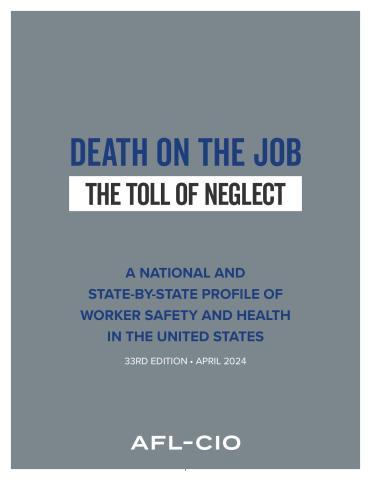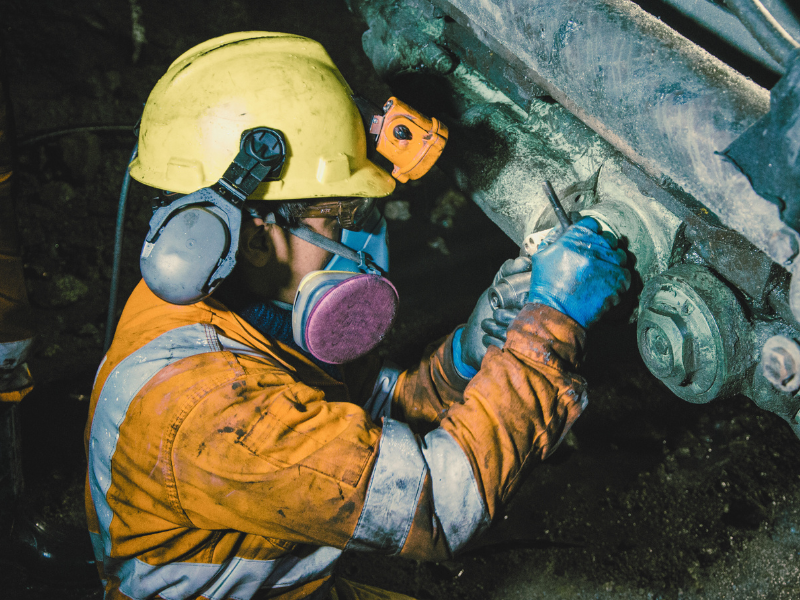Below are AFL-CIO President Richard Trumka's remarks at today's reporter roundtable, as prepared for delivery:
Good morning and thank you all for being here. I hope this is the first of many conversations throughout 2020 about the hopes, aspirations and direct action of working people.
This morning, the AFL-CIO and many unions submitted a petition to the U.S. Department of Labor calling for an emergency workplace infectious disease standard in response to the coronavirus outbreak.
The reports I’m hearing from our affiliate unions are deeply troubling. Guidance from federal authorities have been inconsistent at best and dangerous at worst. Many employers are woefully unprepared. And the virus continues to spread.
There was a contingency plan for this type of situation. Progress was being made on a permanent infectious disease workplace standard. A strong enforceable standard would have provided employers both the tools and the mandate to protect workers from infection.
But President Trump halted it once taking office.
This is part of the Trump administration’s pattern of reckless and dangerous deregulation. Over the past three years, the president and his team have systematically rolled back workplace protections and cut funding for the programs that keep us safe, healthy and alive. The agency charged with protecting workers—OSHA—is rudderless and still without a full-time director. And today there are fewer workplace inspectors today than at any other point in history.
We just learned yesterday, that despite union outcry, the Trump administration is trying to weaken protections for health care workers and first responders. Instead of recommending a minimum of N95 respirators for certain workers at elevated risk, and instead of putting in place other measures that are more effective, the CDC is now claiming a simple face mask is enough for workers who are exposed to infected patients. This change is not based on sound occupational health practice, but shows that hospital associations have an ear in the Trump administration. Further, the shortage of respirators is another reminder that the Trump administration did not prepare for this crisis—and the CDC should know better than to put politics over science.
The AFL-CIO—made up of 55 unions and 12.5 million members—including those on the front lines—is working nonstop to empower and protect those in harm’s way. We are coordinating with our affiliate unions to immediately develop and disseminate educational training and logistical resources and recommendations from the foremost experts. We have trained, educated and equipped our members with the tools they need to be safe on the job. We are demanding the CDC provide protective guidance instead of bad advice that leaves workers at risk.
Make no mistake, we have the most qualified members on the ground. But we should not have to go it alone. Working people are doing our part in the face of the coronavirus outbreak. Now our government must do the same. An emergency workplace infectious disease standard would be a step in the right direction and set in motion a 6-month timeline to create a long overdue permanent standard so we are better prepared if and when the next outbreak occurs. A protective OSHA standard is even more important now that the Trump administration rolled back CDC-recommended protections, leaving working people at greater risk.
The administration’s incompetent response to the coronavirus is the latest example of a system on the brink—working people simply do not believe that our economy or our politics is working for us. We are increasingly skeptical of information, unless it comes from a fellow union member. The most basic tenet of our democracy—voting—remains under attack. There was only one vote center on UCLA’s campus, a university with 40,000 students. Three and four hour wait times were reported. At the center, apparently only 9 machines worked out of 39.
Texas closed 750 polling places after the Supreme Court gutted the Voting Rights Act. A gentleman named Hervis Rogers waited seven hours to vote at a polling station on the campus of Texas Southern University at Houston. These are just a few examples. Is it any wonder people are fed up?
I strongly believe that the 2016 election was an indictment of political elites in both parties that for too long have embraced policies that increase inequality of income, opportunity and power. Donald Trump promised to change the rules and he has, but to whose benefit? More than three years into his administration, it is clear this president only cares about people like himself. Day after day, he’s attacked our wages, our health care, our pension, our safety and our right to form a union—all to further entrench power in the hands of the wealthy elite. He is one of the most anti-worker presidents in my lifetime, and we are looking for something much different in 2020.
Clearly, Tuesday was a big night for Joe Biden. Vice President Biden has overcome a lot of adversity in his life. And his comeback in this election is just another example. Our members know Joe well. He is a longtime friend and ally. He also has some explaining to do with our members, especially around the issue of trade.
While we congratulate Joe Biden on strong Super Tuesday, this race is far from over. Our presidential forum in Orlando on Thursday could not come at a better time. Workers will have an opportunity to interview Vice President Biden and Senator Sanders directly about the issues that are most important to us. Working people are driving this election process. We are evaluating the candidates. We are asking the tough questions. Our voices must be heard. And our support must be earned. Simply put, we have a long way to go.
With that, I am happy to open it up for questions.



